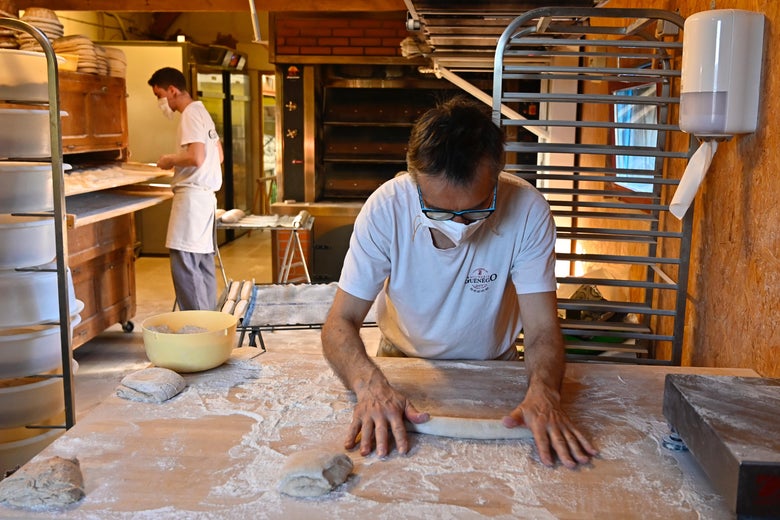
Bakers prepare dough at a boulangerie in Hédé-Bazouges, a suburb of Rennes, France, on Tuesday.
Damien Meyer/Getty Images
What do baguettes and golf have in common? Well, depending on where you are in the world, both are considered essential—even in lockdown. As cities, states, and entire countries order businesses to close to try to slow the spread of the novel coronavirus, there’s ongoing confusion over what is essential and what’s not. There are the obvious ones: grocery stores, pharmacies, and gas stations. But what about liquor stores? Weed dispensaries? Bakeries? Florists?
It’s all a little haphazard—sometimes even the city and state decrees don’t line up. In some jurisdictions, hair salons, animal shelters, and garden retailers are open, while they’re shuttered in others. Day cares are another gray area. Maryland, which does not have a stay-at-home order, decided on Thursday to close its day cares for everyone except the children of essential workers. Connecticut, which does, says they can stay open, though half of the day cares surveyed by the state last week had closed. Or take liquor stores: They’ve mostly remained open, even if just for curbside sales or deliveries. But Pennsylvania, whose stores are state-owned, is one exception. In a similar vein, most states that have legalized recreational or medical marijuana have allowed dispensaries to remain open. Some places have taken a middle approach: Massachusetts, for instance, has shuttered recreational shops but not medical dispensaries.
Some “essentials” are fairly idiosyncratic. Arizona has included golf courses in its list of businesses allowed to continue operations, “if restrictions on food and beverage service … are followed,” to the dismay of a number of the state’s mayors. In Delaware, florists can still remain open for deliveries. Gun stores have been particularly contentious, as demand for firearms grows and lobbyists and gun rights activists argue that a pandemic shouldn’t trump the Second Amendment, the New York Times reported. States are divided on whether gun stores can continue to operate. Among others, Illinois, Michigan, and Ohio are considering them essential; Massachusetts, New Jersey, and New York are not.
It’s clear that public officials are struggling to determine what’s absolutely necessary amid a pandemic. Just three hours after deciding to shut liquor stores and marijuana dispensaries on Monday, Denver changed course after panicked crowds swarmed shops in a last-gasp effort to stock up. Lawton, Oklahoma, also briefly deemed liquor stores nonessential this week before moving it back to the “essential” column. On Tuesday, the Los Angeles County sheriff reversed his decision to order deputies to ensure the closure of gun shops. And although D.C. Mayor Muriel Bowser initially determined that bike shops weren’t essential, she backpedaled over the course of an afternoon. (Bike shops are also considered essential in Philadelphia, New Orleans, and San Francisco.)
Businesses are having trouble navigating the new rules and ensuring that they’re compliant—or are using the uncertainty to keep their doors opens. In League City, Texas, outdoor recreational retailer Cabela’s has continued to stay open, the Texas Tribune reported, claiming that it’s essential because it sells goods related to “food production”—namely, fishing equipment and ready-to-eat meals. In other Texas counties that have required sporting goods stores to shut down, Cabela’s has closed. Ohio Lt. Gov. Jon Husted has responded to confusion in his state by asking business owners to “use good judgment” and create a document “providing the rationale for how you qualify as an essential business.” But the Columbus Dispatch found a mattress store and a tile shop still open—two businesses many would consider nonessential.
Further afield, Europe’s lockdowns are also revealing how culture-dependent “essential” businesses can be. In Belgium, where fries are a national symbol, the country’s 4,600 friteries have been permitted to stay open, the Wall Street Journal reported. And even as France has been on strict lockdown since March 16, the country’s boulangeries, cheese shops, butchers, tobacco shops, and dry cleaners are still in operation. Boulangeries are especially important as social institutions in French communities, since baguette runs are a daily ritual in France. “It’s a morning, midday and evening tradition for the French,” Macron said in 2018 to support the campaign to give the baguette UNESCO heritage status.
But even France is forgoing tradition to ensure public safety, at least on a smaller scale. Concerned French are buying multiple baguettes and freezing them, the Associated Press reported, and the Mediterranean town of Sanary-sur-Mer has started fining residents 135 euros for popping out for just one baguette at a time. The baguette has now become a symbol, in a sense, of the fraught intersection of heritage, communal support, and social distancing. For some, it’s a comfort food. For others, as a French baker told the AP, it fulfils a social role in a period of mass isolation. But “[t]his is no time for people’s moods. The priority is to not get sick,” said the mayor of Sanary-sur-Mer, the AP reported. “You can freeze bread. You can even live without it.”
Even amid a pandemic, the small pleasures of life—the crispy crust of a fresh baguette, or a bourbon after a long day at the home office—can be essential supplies for surviving a shutdown.
Readers like you make our work possible. Help us continue to provide the reporting, commentary and criticism you won’t find anywhere else.
Join Slate Plusfrom Slate Magazine https://ift.tt/2ygO0VJ
via IFTTT
沒有留言:
張貼留言